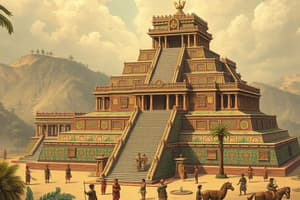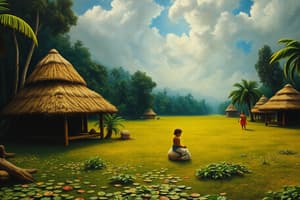Podcast
Questions and Answers
What was the primary purpose of the channels built by the Aztecs?
What was the primary purpose of the channels built by the Aztecs?
- To create a system of water-borne transportation (correct)
- To provide crop irrigation
- To transport people and goods to market
- To serve as a source of drinking water
How many crops per year were the chinampas able to produce?
How many crops per year were the chinampas able to produce?
- 2-3 crops per year
- 4-5 crops per year
- 3-4 crops per year (correct)
- 1-2 crops per year
What was the most valuable fertilizer used on the chinampas?
What was the most valuable fertilizer used on the chinampas?
- Food leftovers and agricultural residues
- Human excrement or feces (correct)
- Urine
- Animal manure
What was human urine used for by the Aztecs?
What was human urine used for by the Aztecs?
Which of the following animals did the Aztecs consume?
Which of the following animals did the Aztecs consume?
What invention did the Aztecs create for transportation in their water systems?
What invention did the Aztecs create for transportation in their water systems?
What is a unique feature of the Maya number system?
What is a unique feature of the Maya number system?
How did the Maya people use Maya Blue outside of pottery and religious contexts?
How did the Maya people use Maya Blue outside of pottery and religious contexts?
What engineering achievement did Maya engineers accomplish in architecture?
What engineering achievement did Maya engineers accomplish in architecture?
How did the Maya arts progress in comparison to Europe during the Dark Ages?
How did the Maya arts progress in comparison to Europe during the Dark Ages?
What objects did the Maya people use as a form of 'money'?
What objects did the Maya people use as a form of 'money'?
What distinguished Mayan literacy from other indigenous literacies of America?
What distinguished Mayan literacy from other indigenous literacies of America?
What type of opportunities did the calmecac offer compared to the telpochcalli?
What type of opportunities did the calmecac offer compared to the telpochcalli?
At what age did children typically begin attending the calmecac?
At what age did children typically begin attending the calmecac?
Why were noble children held to a higher standard than commoner children in Aztec schools?
Why were noble children held to a higher standard than commoner children in Aztec schools?
In Aztec society, where did the nobility dominate key positions?
In Aztec society, where did the nobility dominate key positions?
What was a limited opportunity for individuals to better their social position in Aztec society?
What was a limited opportunity for individuals to better their social position in Aztec society?
What prevailed in Aztec society in terms of promotions and demotions?
What prevailed in Aztec society in terms of promotions and demotions?
What defines the northern border of Mesoamerica?
What defines the northern border of Mesoamerica?
Which of the following countries are NOT included in the historic region of Mesoamerica?
Which of the following countries are NOT included in the historic region of Mesoamerica?
Which of the following cultural traits does NOT define the Mesoamerican region?
Which of the following cultural traits does NOT define the Mesoamerican region?
Which of the following statements about the Maya civilization is TRUE?
Which of the following statements about the Maya civilization is TRUE?
What does the term 'nomadic' mean in the context of the Maya civilization?
What does the term 'nomadic' mean in the context of the Maya civilization?
Which of the following groups of people inhabited Mesoamerica for thousands of years?
Which of the following groups of people inhabited Mesoamerica for thousands of years?
What was the primary purpose of trephination, the surgical practice of removing a portion of the skull, in pre-Columbian Peru?
What was the primary purpose of trephination, the surgical practice of removing a portion of the skull, in pre-Columbian Peru?
What was a significant achievement of the ancient Maya civilization in terms of land management?
What was a significant achievement of the ancient Maya civilization in terms of land management?
According to a recent interpretation, what was the primary purpose of the Aztec Sun Stone?
According to a recent interpretation, what was the primary purpose of the Aztec Sun Stone?
Which of the following statements best describes the Aztec society's approach to waste management?
Which of the following statements best describes the Aztec society's approach to waste management?
What was a common practice among the Inca civilization related to their religious beliefs?
What was a common practice among the Inca civilization related to their religious beliefs?
Which of the following statements best describes the purpose of public ritual sacrifices in Mesoamerican civilizations?
Which of the following statements best describes the purpose of public ritual sacrifices in Mesoamerican civilizations?
Flashcards are hidden until you start studying
Study Notes
Aztec Agriculture and Sustainability
- The Aztecs developed chinampas, a system of floating gardens that provided crop irrigation and an easy way to transport products to market.
- Chinampas were highly productive, producing up to four crops a year, and about two-thirds of the food consumed in the city.
- They grew a variety of crops, including maize, beans, tomatoes, pumpkins, chilis, flowers, and medicinal herbs.
- The Aztecs used organic waste, including food leftovers and agricultural residues, to fertilize their crops.
- Human excrement was used as a valuable fertilizer, and human urine was used as a mordant in the dyeing of fabrics.
Maya Achievements
- The Maya people developed a number system based on the numeral 20.
- They developed different preparative strategies to obtain inorganic-organic hybrid materials, similar to Maya Blue.
- Maya architecture is unique and unlike any other style in the world, with structural mechanics for multi-story buildings.
- The Maya people invented the blast furnace 2,000 years before it was patented in England.
- They used various objects, including greenstone beads, cacao beans, and copper bells, as a form of currency.
Maya Education and Culture
- Maya literacy stands out from most other indigenous literacies of America.
- The average Mayan family size was about 5 to 7.
- They used three different ways of recording: codices, hieroglyphic symbols written on paper and cloth or animal skin.
- Only noble families were allowed to go to school, while commoner children were taught at home.
- Maya children typically began attending school between the ages of 6 and 13.
- The schools imposed harsh punishments on their students for misbehavior, with the calmecac being especially strict.
Aztec Society and Culture
- Aztec society was hierarchical and divided into clearly defined classes.
- The nobility dominated the key positions in the military, state administration, judiciary, and priesthood.
- Traders could become extremely wealthy and powerful, but their prosperity was based on their class.
- There was a limited opportunity for individuals to better their social position, especially in the military and religious spheres.
- Nepotism prevailed, but promotions could be obtained on merit as well as demotions from incompetence.
Mesoamerica
- The northern border of Mesoamerica runs west from a point on the Gulf coast of Mexico above the modern port of Tampico.
- The historic region of Mesoamerica comprises the modern-day countries of northern Costa Rica, Nicaragua, Honduras, El Salvador, Guatemala, Belize, and central to southern Mexico.
- Cultural traits that define the region include the domestication of maize, beans, avocado, and vanilla, and a common architectural style.
- The region was populated by groups such as the Olmec, Zapotec, Maya, Toltec, and Aztec people.
Studying That Suits You
Use AI to generate personalized quizzes and flashcards to suit your learning preferences.




